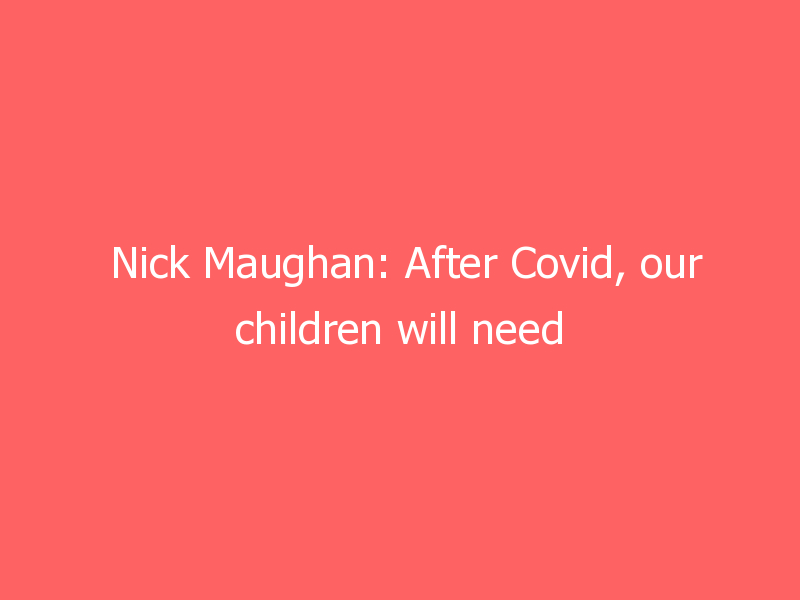
Nick Maughan is an investor and philanthropist.
All young people have been dealt a bad hand by the indirect effects of the pandemic – school closures, disrupted social lives, stifled educations, scuppered paths to university, the looming prospect of insurmountable debt, and diminished prospects for gainful employment. However, some young people are more equal than others.
The current restrictions look likely to last until Easter and possibly beyond. The evidence from the first national lockdown is unambiguous – children from more disadvantaged backgrounds are more adversely affected by the direct and indirect effects of such measures. The broad picture remains unchanged and will be made worse by current circumstances.
The problems affecting many less advantaged young people today are a regular feature of news headlines: knife crime, drug abuse, lack of access to quality education and skills development and destructive gang culture. Across all this hangs the spectre of mental health concerns, which have been gravely exacerbated since the onset of the pandemic and the resulting lockdowns, casting a dark cloud over our children’s future.
Confronted with this bleak outlook, we should be looking beyond short-term government policy – in terms of educational subsidies, grants and home learning tools – and thinking about the broader state of the social fabric that will need addressing in order to surmount the challenges that have been piled upon ‘Generation Covid’ in the long-term.
Support for disadvantaged young people needs to happen at a local level. There could be no better illustration of where society can step up than with the concept of out-of-school clubs.
Over the past decade national youth work budgets have been squeezed, leaving many disadvantaged young people vulnerable to dangerous distractions, with no safe haven through which to develop their skills and talents outside of the classroom.
Further data collated by YMCA England and Wales last year showed that spending on youth services in England has been decimated by 69 per cent in a decade, and is set to reach its lowest point in a generation next year. Analysis of figures revealed average spend on youth services per local authority plummeted from GBP7.79m in 2010 to a planned expenditure of just GBP2.45m this year.
This comes after research by the All-Party Parliamentary Group (APPG) on knife crime, published in May 2019, found that areas suffering the largest cuts to youth spending on services such as social clubs and youth workers had seen bigger increases in knife crime.
Out of school youth work, through youth clubs in particular, has its origins in the 1880s, arising out of the Ragged School and Sunday School movements. From the 1960s onwards, out of school work with young people increasingly shifted away from the voluntary sector to the state – but this support has recently dropped off. These cuts have seen a marked shift from prevention towards support for those already in crisis or at very high risk, and increasing numbers of young people are not supported until their needs reach a crisis.
It is against this backdrop that my foundation will be devoting considerable resources to nurturing out-of-school clubs, designed to help young people make successful transitions to adulthood. One such project we’ll be contributing to is the reconstruction of the Waterside Centre in Newbury, undertaken by the Berkshire Youth Trust, a youth support charity that has been operating in the region for 75 years.
The Waterside Centre – on which construction got underway in September and is set to open in this Spring, hopefully just as restrictions begin to be lifted – will be the first in a series of ‘Inspired Facilities’ the Trust aims to roll out across Berkshire and, eventually, Britain.
Through the provision of modern facilities, offering a range of activities from sport to music making, counselling services to vocational training and routes to gainful employment, these state-of-the-art youth centres will offer safe havens for young people, opportunities to develop their skills and talents, and give them respite from the stresses and strains of their often difficult and complicated lives.
Last year, Boris Johnson took personal charge of a new cabinet committee to tackle surging levels of knife crime and violence, with a particular focus on ‘county lines’ gangs that are abusing and exploiting children. Organisations like The Berkshire Youth Trust and BoxSmart work towards preventing the circumstances arising through which such behaviour becomes an option or temptation for young people in the first place.
Naturally, the charitable sector can’t go it alone. We will continue to push for government help. But we must also foster a culture in which we can rely on the conscience, goodwill and dynamism of the private sector to get things done.
For understandable reasons, since the onset of the pandemic our focus has been on government and what it can do for us. And we are beginning to see light at the end of the tunnel.
With a vaccine in sight, we should be shifting our focus away from what crutches government can provide to support the broken parts of our system, and back towards building our society’s muscle to do the heavy lifting on the issues that matter.
Originally found on Conservative Home Read More







